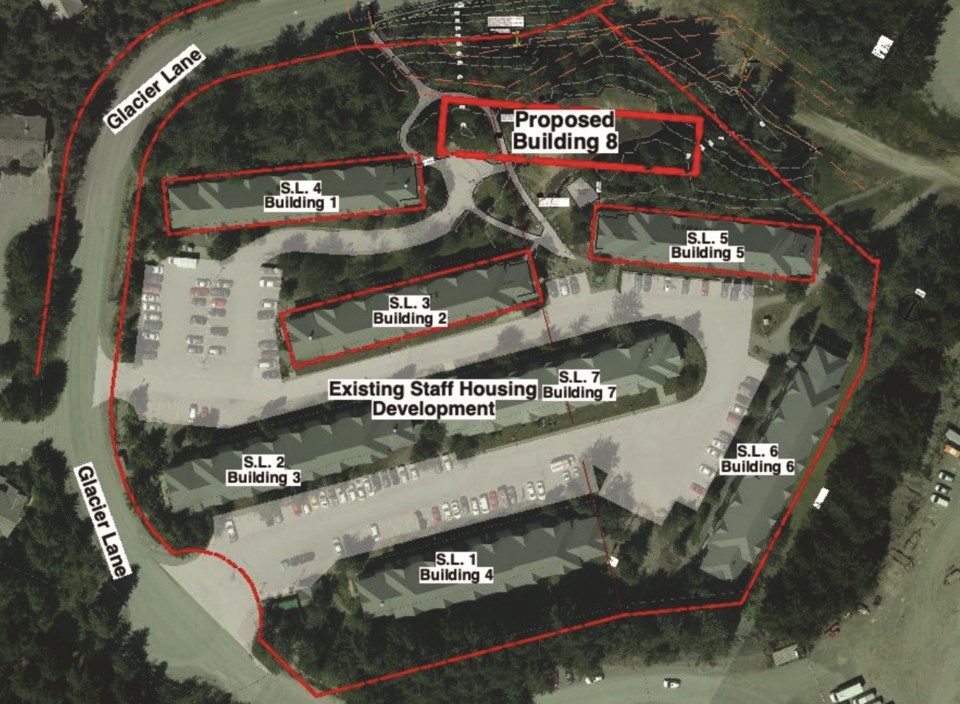A new staff housing building proposed for Whistler Blackcomb employees is one step closer to breaking ground.
On March 22, Whistler mayor and council gave third readings to both a housing agreement and a rezoning bylaw for the Glacier Lane lot, offering the project a clear path forward to adoption at a future council meeting.
The six-storey, 66-unit “Glacier 8” facility would house about 240 employees at Whistler Blackcomb’s existing dormitory-style staff housing complex, in a mix of shared one-bedroom and two-bedroom units. Vail Resorts first submitted a rezoning application for the building back in June 2019. The project was initially expected to welcome seasonal residents in time for the 2020-2021 ski season but was tossed onto the backburner amid the COVID-19 pandemic.
“I think this is terrific, and look forward to seeing shovels in the ground very soon,” said Mayor Jack Crompton.
The zoning amendment bylaw previously received third reading in January 2020, but was brought back to council this week with a reduction to its parking requirements and minimum parcel size. (The development’s density, including overall strata plan area, site coverage, and floor space ratio, remains unchanged from earlier proposals).
As part of the rezoning, Vail Resorts has committed to providing two share cars for Glacier 8 residents, in addition to a one-time, $1.08 million contribution to help fund increased transit services to the employee housing complex over a 25-year period, all in an effort to limit occupants’ reliance on personal vehicles. The site plan calls for the addition of 14 more parking stalls.
Revised plans also include elevator access to all six floors. A minimum of four out of the project’s 66 units must be one-bedroom accessible units adhering to BC Housing Design Guidelines and Construction Standards, while at least two units will also be designated for temporary respite use. All others will be configured as two-bedroom units featuring a shared kitchen and bathroom, according to a report from Resort Municipality of Whistler (RMOW) staff.
The building will include storage areas on the bottom two floors and common areas located on the third and fourth floors, alongside two shared laundry facilities for residents. The project will also be constructed in accordance with the RMOW’s Green Building Policies and to Step 3 of BC’s Energy Step Code, and will not connect to natural gas lines.
An associated housing agreement similarly given third reading at Tuesday night’s meeting, meanwhile, authorizes the RMOW to set usage, occupancy and eligibility restrictions, as well as permitted rental rates for the proposed building.
Under the housing agreement, workers eligible to reside in the building must be employed for an average of at least 30 hours per week. The document caps rent at $950 per month for a one-bedroom unit and $1,900 per month for a two-bedroom unit, including utilities. It allows Vail Resorts to increase rental rates once every 12 months, but prevents the company from raising rent beyond the levels set out in B.C.’s Residential Tenancy Act.
As Councillor Cathy Jewett pointed out, that pricing works out to “a very reasonable” $475 per month per person in a case where two employees share a bedroom.
While Jewett raised minor concerns over the number of laundry units planned for the building, councillors in attendance appeared overwhelmingly supportive of the long-proposed project, particularly when it came to the commitment to provide car-share vehicles.
“Obviously a few years have passed since this was first brought forward to us and it will be great when the ribbon gets cut and people start sleeping in this building,” said Coun. John Grills.
The project marks another step towards the RMOW’s goal of creating 1,000 new employee beds by 2023, while aligning with Vail Resorts’ recently renewed pledge to create affordable housing in its mountain communities. In a letter to employees earlier this month, CEO Kirsten Lynch said the company plans to “aggressively pursue building new affordable housing on the land we own, and pursue company leases in existing affordable housing developments.”
The RMOW expects the project to come back to council in the near future.




